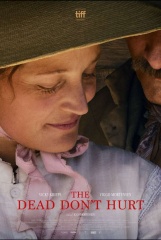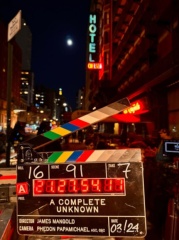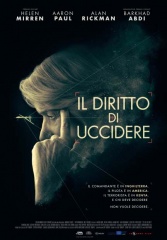|
|
ROBIN HOOD: IL NUOVO TANDEM RIDLEY SCOTT-RUSSELL CROWE GUARDA AL MITICO 'PRINCIPE DEI LADRI' SULLO SFONDO DELLA CORROTTA CITTA' DI NOTTINGHAM. L'AMORE HA IL VOLTO DI CATE BLANCHETT NELLE VESTI DELLA VEDOVA LADY MARION
Seconde visioni d'Autore - Cinema sotto le stelle
RECENSIONE n. 1 - RECENSIONE n. 2 - 63. Festival del Cinema di CANNES (12-23 Maggio 2010) - Da mercoledì 12 MAGGIO
"Esiste una lunga serie di possibili Robin Hood. E anche il più probabile di essi non è niente di più di un bagliore nella notte. Inizialmente era solo una leggenda tramandata oralmente, alla fine è diventata una sceneggiaturaâ.
Lo studioso J. C. Holt
âRidley (Scott) voleva raccontare la versione dell'uomo-prima-del-mito di Robin Hood. Tutti conoscono la leggenda che ovviamente si basa sull'esagerazione degli eventi reali. Questo mito è radicato nell'oppressione e nell'idea che ogni qualvolta che chi è al potere si approfitta delle masse, ecco che arriva un eroe a difendere la gente comune. E, soprattutto nella storia inglese, questo qualcuno è quasi sempre un fuorilegge che si assume tale compito. Quello che Ridley voleva fare era immaginare quali fatti reali avrebbero potuto dar vita alla leggenda di Robin Hood".
Lo scrittore Brian Helgeland
âTutti parlano di come Robin Hood rubasse ai ricchi per dare ai poveri, ma noi abbiamo pensato che fosse importante scegliere un momento del folklore medievale in cui il paese è sull'orlo della carestia e totalmente ignorato dai regnanti. La gerarchia al potere è il nemico, e l'uomo comune che si schiera contro di essa è Robin Hood. Nell'ambito di questa idea, non abbiamo comunque dimenticato le aspettative e il romanticismo della leggenda. C'è dell'umorismo in tutto questo? Si. C'è un sacco di azione? Si".
Il regista Ridley Scott
"Ho trovato il progetto entusiasmante. Robin Hood è sempre stato uno dei miei eroi preferiti sin da quando ero piccolo. Ho amato molto i vari film su di lui che ho visto da bambino. Esiste una sorta di connessione universale che ciascuno di noi stabilisce con Robin Hood e che è alla base della storia: ci potrebbe essere qualcuno là fuori che vuole veramente combattere l'ingiustizia. Robin possiede una qualità edificante alla quale il pubblico risponde... Ho detto che avrei fatto Robin Hood solo se si fosse trattato di una storia originale. E' una delle storie in lingua inglese che si tramandano da più tempo. Per tanto bisogna trattarla con grande rispetto. Ho deciso che, per poter creare una versione più nuova di Robin Hood, era importante considerare come un comprensibile errore tutto quello che ne avevamo appreso attraverso le varie leggende. Il nostro Robin doveva essere diverso da come era stato raccontato fino a quel momento. Prendiamo ad esempio il suo rapporto con Little John. I due inizialmente non vanno d'accordo. Quando li incontriamo per la prima volta stanno litigando. Ma non succede su un tronco su un fiume dove si stanno picchiando, come è stato raccontato all'infinito. Noi abbiamo ridefinito i tempi e spostato l'avvenimento in un altro momento... Abbiamo una situazione in cui l'uomo che in pratica ha inventato le tasse è lo stesso Re Giovanni firmatario della prima versione della Magna Carta. Abbiamo un periodo compreso tra il 1199 e il 1215, e ci sembrava che potesse essere il momento perfetto per la nascita di una rivoluzione ⦠o di una figura rivoluzionaria. E per quanto il film ruoti attorno alla Magna Carta, racconta anche della nascita di una nazione â la nascita dell'Inghilterra e di tutto ciò che di splendido essa rappresenta".
L'attore Russell Crowe
(Robin Hood USA/REGNO UNITO 2010; avventura; 148'; Produz.: Imagine Entertainment/Universal Pictures, con la partecipaz. di Relativity Media/Scott Free Productions; Distribuz.: Universal Pictures International Italy)
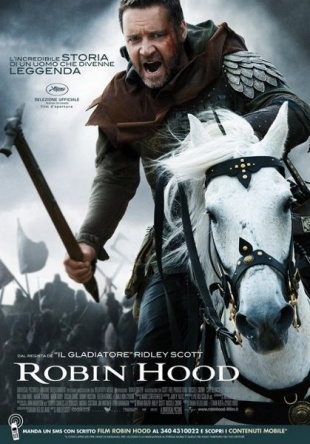 (See Short Synopsis, and Synopsis in English; See English Translation of ITALIAN REVIEWS by PATRIZIA FERRETTI and ENRICA MANES);
(See Flash Review by Justin Chang, "www.variety.com", here - Voice: 'Il giudizio della critica' - 'International Press')
(See Short Synopsis, and Synopsis in English; See English Translation of ITALIAN REVIEWS by PATRIZIA FERRETTI and ENRICA MANES);
(See Flash Review by Justin Chang, "www.variety.com", here - Voice: 'Il giudizio della critica' - 'International Press')
|
Titolo in italiano: Robin Hood
Titolo in lingua originale:
Robin Hood
Anno di produzione:
2010
Anno di uscita:
2010
Regia: Ridley Scott
Sceneggiatura:
Ethan Reiff & Cyrus Voris, Brian Helgeland e Paul Webb
Soggetto: Tratto da una storia di Helgeland e ETHAN REIFF & CYRUS VORIS (autori per la TV di Sleeper Cell) con la sceneggiatura firmata da Helgeland.
PRELIMINARIA:
Girato in Inghilterra e nel Galles, Robin Hood copre il periodo che va dalla morte di Re Riccardo I nel 1199 fino alla firma della Magna Carta nel 1215.
Le storie di Robin sono tra le più antiche leggende tramandate oralmente in Inghilterra, e possono essere fatte risalire al periodo medievale del IX secolo con il racconto di Robin the Be-header (Robin il Tagliatore di Teste) per poi trovare una forma letteraria nelle ballate del XV e XVI secolo come A Gest of Robyn Hode, Robin Hood and the Curtal Friar e Robin and the Monk. Per quel che ne sappiamo, comunque, non esiste un vero Robin che possiamo considerare l'autentica figura ispiratrice. Dai suggerimenti che il nome Robehod veniva spesso applicato ad un uomo divenuto un fuorilegge, fino alla congettura che Robin Hood fosse uno pseudonimo comunemente usato dai ladri, le teorie abbondano e la leggenda sopravvive.
L'eroe è stato anche largamente rappresentato sul grande schermo. Sono stati realizzati almeno 30 film per il cinema e per la TV, a partire dall'adattamento di Ivanhoe del 1913, ai film con Douglas Fairbanks (Robin Hood, 1922), Errol Flynn (Le avventure di Robin Hood, 1938), Sean Connery e Audrey Hepburn (Robin e Marian, 1976) e Kevin Costner (Robin Hood: il principe dei ladri, 1991), oltre alle popolari serie televisive come quella della BBC con Patrick Troughton, Robin Hood (1953), Robin of Sherwood (1984) e la più recente Robin Hood (2006).
Al di là della sua indiscussa popolarità , tuttavia, le storie per lo schermo su Robin raramente si evolvono, con i filmaker che invariabilmente si soffermano sugli episodi familiari a tutti, come quelli legati al perfido Sceriffo di Nottingham, al cattivo Guy di Gisburne e alla più celebre della damigelle in pericolo, Marion. Altrettanto univocamente, Robin è stato rappresentato o come un nobile caduto in disgrazia o, più spesso, come un furfante galantuomo che ruba ai ricchi per donare ai poveri.
Durante le riprese di American Gangster con Sir Ridley Scott, il produttore Brian Grazer ha discusso con Russell Crowe di una possibile realizzazione di un nuovo Robin Hood, con lui come interprete. Grazer desiderava tornare a lavorare con l'attore, con il quale aveva già realizzato due film di successo â A Beautiful Mind, per il quale Crowe è stato candidato all'Oscar, e in Cinderella Man. Pensando a questo nuovo progetto, i due erano entrambi interessati a proporre una versione originale della vecchia leggenda: una storia che raccontasse le origini di Robin Hood, a partire dai suoi anni trascorsi come arciere dell'esercito di Re Riccardo. Ambientato al tempo delle Crociate, questo film d'azione e di avventura avrebbe fornito una cornice storica alle altre avventure raccontate di recente sul grande e piccolo schermo.
Nella sceneggiatura, basata su una storia di Helgeland, Ethan Reiff e Cyrus Voris, incontriamo per la prima volta l'arciere Robin Longstride, fante dell'esercito di Re Riccardo al ritorno dalla Terza Crociata in Terra Santa. Riccardo â nel tentativo di recuperare la somma pagata al re francese che lo aveva tenuto in ostaggio mentre tornava dalla Crociata â sta assediando un castello francese. Secondo le cronache dell'epoca, durante l'assedio Riccardo venne ferito al collo da una freccia e morì poco dopo. Sua madre, Eleonora, ne rimase devastata e, di conseguenza, la corona passò a suo fratello minore, il Principe Giovanni.
Scegliendo come inizio per la sua storia il momento della morte di Riccardo, Helgeland ha immaginato che Robin, avendo trascorso all'estero un'infanzia tormentata, cogliesse l'opportunità per far ritorno nella nativa Inghilterra per la prima volta da quando aveva cinque anni. Al suo approdo in terra inglese, Robin trova una nazione impoverita e priva di uomini a causa della folle necessità di Riccardo di finanziare le sue guerre. Lo spettro di un'invasione francese si profila all'orizzonte, e il fratello incompetente di Riccardo si limita a guardare il suo popolo in preda alle sofferenze, preoccupandosi solo di riempire i suoi forzieri.
Per gli scrittori era fondamentale mostrare lo stato disastroso in cui verteva l'economia inglese in quell'epoca, e anche quanto il paese fosse diventato desolato. Volevano mostrare come l'arrivo di Robin coincidesse con il periodo in cui Giovanni imponeva ai suoi sudditi delle tasse improbabili, molto al di sopra delle loro possibilità , concedendo loro in cambio pochissimo cibo, qualche vestito e miseri ripari. La sconfitta della classe dirigente da parte di Robin non consisteva solo nel rubare il grano per restituirlo alla gente di Nottingham, ma anche nell'ispirare i suoi compatrioti ad assumere il controllo del proprio destino.
Stabilire un retroscena per Robin è stato fondamentale per comprendere perché egli diventi il difensore del suo popolo. Nella nostra storia, Robin scopre che suo padre era lo scalpellino Thomas Longstride, un oratore molto apprezzato ed il principale autore di quella che sarebbe stata la Forest Charter (Carta de Foresta). Questa carta, antesignana della Magna Carta, illustrava i diritti e i privilegi dell'uomo comune, proteggendolo dagli abusi dell'aristocrazia. Il predecessore di Riccardo, Enrico II, aveva inteso questa istanza politica di Longstride come tradimento e lo aveva fatto uccidere davanti al figlio ancora piccolo.
Cast: Russell Crowe (Robin Hood)
William Hurt (William Marshall)
Kevin Durand (Little John)
Cate Blanchett (Lady Marion)
Mark Strong (Sir Godfrey)
Matthew Macfadyen (Sceriffo di Nottingham)
Danny Huston (Re Riccardo)
Eileen Atkins (Eleanor of Aquitaine)
Scott Grimes (Will Scarlet)
Bronson Webb (Jimoen)
Oscar Isaac (Principe John)
Alan Doyle (Allan A'Dayle)
Léa Seydoux (Principessa Isabella)
Max von Sydow (Sir Walter Loxley)
Musica: Marc Streitenfeld
Costumi: Janty Yates
Scenografia: Arthur Max
Fotografia: John Mathieson
Montaggio: Pietro Scalia
Casting: Jina Jay
Scheda film aggiornata al:
25 Novembre 2012
|
Sinossi:
IN BREVE:
NellâInghilterra del 13° secolo, Robin e il gruppo di predatori con cui si accompagna affrontano la corruzione di un paesino locale e guidano una rivolta contro la corona che continua ad alterare lâequilibrio dei paesi di tutto il mondo. Che sia ladro o eroe, questâuomo dâumili origini si trasformerà per sempre nel simbolo di libertà di un intero popolo.
IN DETTAGLIO:
Lâavventura di Robin Hood (Russell Crowe) narra le vicende di un abile arciere, che, prima di addentrarsi in un nuovo capitolo della sua vita, passava il tempo a salvarsi la pelle al fianco di Re Riccardo nella guerra contro lâesercito francese. Alla morte di Riccardo Cuor di Leone, Robin si trasferisce a Nottingham, piccolo cittadina inglese sopraffatta dal dispotismo di uno sceriffo corrotto e da una sfilza di rovinose imposte locali. A Notthingham, si innamora di una vedova forte e coraggiosa, Lady Marion (la vincitrice di un Oscar Cate Blanchett) che, sin dallâinizio, però, nutre seri dubbi sulla vera identità e sulle reali motivazioni dellâavventuriero. Desideroso di conquistare lâamore della giovane Marion e salvare la cittadina, Robin mette insieme una squadra di coraggiosi combattenti, le cui straordinarie capacità mercenarie sono paragonabili solo alla loro inesauribile voglia di vivere. Insieme, iniziano a depredare gli indulgenti aristocratici della città per sconfiggere le iniquità imposte dallâodioso sceriffo.
Con il paese indebolito da decenni di guerra, tormentato dallâinconcludente amministrazione del nuovo Re, soggetta a guerriglie interne e minacce esterne, Robin e i suoi uomini decidono allora di dare ascolto al forte desiderio di nuove avventure che li contraddistingue. Questo improbabile eroe e i suoi alleati fanno di tutto per evitare che il Paese scivoli in una sanguinosa guerra civile e torni ad essere la gloriosa Inghilterra di una volta.
SHORT SYNOPSIS
In 13th century England, following the death of Richard the Lion Heart, Sir Robin of Loxley, Count of Huntington (Russell Crowe) arrives in Nottingham, a town suffering from the corruption and crippling taxation of a despotic sheriff (Matthew Macfadyen). Hoping to win the heart of the beautiful Lady Marion (Cate Blanchett) and free the local populace, Robin assembles a gang of mercenaries whose skill in combat is equalled only by their appetite for lifeâs pleasures. Based in Sherwood Forest, this unlikeliest of heroes and his allies set off to defend the population from the threat of bloody civil war and restore England to its former glory.
SYNOPSIS
Oscar® winner Russell Crowe stars as the legendary figure known by generations as âRobin Hood,â whose exploits have endured in popular mythology and ignited the imagination of those who share his spirit of adventure and righteousness. In 13th century England, Robin and his band of marauders confront corruption in a local village and lead an uprising against the crown that will forever alter the balance of world power. And whether thief or hero, one man from humble beginnings will become an eternal symbol of freedom for his people.
The untitled Robin Hood adventure chronicles the life of an expert archer, previously interested only in self-preservation, from his service in King Richardâs army against the French. Upon Richardâs death, Robin travels to Nottingham, a town suffering from the corruption of a despotic sheriff and crippling taxation, where he falls for the spirited widow Lady Marion (Oscar® winner Cate Blanchett), a woman skeptical of the identity and motivations of this crusader from the forest. Hoping to earn the hand of Maid Marion and salvage the village, Robin assembles a gang whose lethal mercenary skills are matched only by its appetite for life. Together, they begin preying on the indulgent upper class to correct injustices under the sheriff.
With their country weakened from decades of war, embattled from the ineffective rule of the new king and vulnerable to insurgencies from within and threats from afar, Robin and his men heed a call to ever greater adventure. This unlikeliest of heroes and his allies set off to protect their country from slipping into bloody civil war and return glory to England once more.
Commento critico (a cura di PATRIZIA FERRETTI)
|
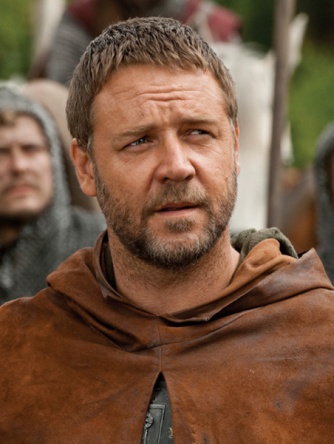 RIDLEY SCOTT TROVA SEMPRE LA CHIAVE GIUSTA PER QUALSIASI TOPPA, TANTO PIUâ QUANDO SI PONE, PER SUA SCELTA, A TU PER TU CON STORIE âARCHETIPEâ. MA FORSE LE SCENE MADRI, CHE NON POSSONO MANCARE IN UN KOLOSSAL PARA STORICO-ROMANTICO COME QUESTO, SI DEVONO PESCARE NEL FLUSSO SPASMODICO DI BATTAGLIE, AGGRESSIONI E ASSALTI A FERRO E FUOCO, O TRA LE SERRATE GRIGLIE STORICO-POLITICHE, INTERVALLATE DAI CURIOSI, FOLKLORISTICI SOLLAZZI SERALI MALGRADO LA MISERIA NERA GALOPPANTE (FORSE PROPRIO PER LENIRE QUELLA?) IN QUEL DI NOTTINGHAM. IL NEO ROBIN HOOD, PIUâ FILOSOFO CHE FUORILEGGE, EPPURE TEMIBILE ARCIERE DALLA MIRA INECCEPIBILE, RILUCE IN TUTTA LâIRRADIANTE AURA DELLâUOMO âFORZA, ONORE, AMORE E SOLIDARIETAââ, CONDIVISE CON LâEROINA ROMANTICA LADY MARION/BLANCHETT
RIDLEY SCOTT TROVA SEMPRE LA CHIAVE GIUSTA PER QUALSIASI TOPPA, TANTO PIUâ QUANDO SI PONE, PER SUA SCELTA, A TU PER TU CON STORIE âARCHETIPEâ. MA FORSE LE SCENE MADRI, CHE NON POSSONO MANCARE IN UN KOLOSSAL PARA STORICO-ROMANTICO COME QUESTO, SI DEVONO PESCARE NEL FLUSSO SPASMODICO DI BATTAGLIE, AGGRESSIONI E ASSALTI A FERRO E FUOCO, O TRA LE SERRATE GRIGLIE STORICO-POLITICHE, INTERVALLATE DAI CURIOSI, FOLKLORISTICI SOLLAZZI SERALI MALGRADO LA MISERIA NERA GALOPPANTE (FORSE PROPRIO PER LENIRE QUELLA?) IN QUEL DI NOTTINGHAM. IL NEO ROBIN HOOD, PIUâ FILOSOFO CHE FUORILEGGE, EPPURE TEMIBILE ARCIERE DALLA MIRA INECCEPIBILE, RILUCE IN TUTTA LâIRRADIANTE AURA DELLâUOMO âFORZA, ONORE, AMORE E SOLIDARIETAââ, CONDIVISE CON LâEROINA ROMANTICA LADY MARION/BLANCHETT
Definire âfuorileggeâ. Ridley Scott apre il suo Robin Hood con alcune didascalie in calligrafia goticheggiante come ben si conviene a questo inedito affresco para storico-romantico con cui affronta uno dei personaggi più gettonati negli anni (manca poco ad |
|
 un centinaio) tra piccolo e grande schermo. E lo fa per far mettere subito a fuoco allo spettatore il cardine motore di tutta lâepica storia. Non vi è dubbio che in un affresco accuratissimo come questo sul piano di scenografie, costumi e fotografia non si lesinino esempi a raffica su quali, come, quando e perché, germinino, prolifichino e dilaghino i fuorilegge. Tra razzie, scorribande di predoni magari in erba, castelli o granai messi a ferro e fuoco, Scott non si fa mancare nulla sul set del suo Robin Hood, per il quale altri non poteva scegliere se non il suo attore-feticcio Russell Crowe. E come dargli torto? Crowe si conferma indubbiamente il migliore nellâassimilare e riflettere sullo schermo, in un caleidoscopio di chiaroscuri indelebili, lo Scott pensiero sullâanima di ogni personaggio e della storia che questi è chiamato ad abitare. La loro visione corre veloce sullo stesso binario, questa volta
un centinaio) tra piccolo e grande schermo. E lo fa per far mettere subito a fuoco allo spettatore il cardine motore di tutta lâepica storia. Non vi è dubbio che in un affresco accuratissimo come questo sul piano di scenografie, costumi e fotografia non si lesinino esempi a raffica su quali, come, quando e perché, germinino, prolifichino e dilaghino i fuorilegge. Tra razzie, scorribande di predoni magari in erba, castelli o granai messi a ferro e fuoco, Scott non si fa mancare nulla sul set del suo Robin Hood, per il quale altri non poteva scegliere se non il suo attore-feticcio Russell Crowe. E come dargli torto? Crowe si conferma indubbiamente il migliore nellâassimilare e riflettere sullo schermo, in un caleidoscopio di chiaroscuri indelebili, lo Scott pensiero sullâanima di ogni personaggio e della storia che questi è chiamato ad abitare. La loro visione corre veloce sullo stesso binario, questa volta |
|
 convogliato narrativamente sulla contestualizzazione, e dunque sulle origini di un personaggio normalmente illustrato nei vari capitoli centrali di ciò che lo ha reso leggenda. Ridley Scott e Russell Crowe hanno invece felicemente optato per chiudere proprio dove gli altri hanno iniziato, per aprire così unâinedita pagina affacciata sul prima. Un prima che dâaltra parte scarta totalmente dal banale flusso cronologico di un possibile âbiopicâ: si affidano ad un solo flashback cruciali schegge dâinfanzia, rievocate da Robin Hood adulto sullâonda di un inatteso e spiazzante racconto.
convogliato narrativamente sulla contestualizzazione, e dunque sulle origini di un personaggio normalmente illustrato nei vari capitoli centrali di ciò che lo ha reso leggenda. Ridley Scott e Russell Crowe hanno invece felicemente optato per chiudere proprio dove gli altri hanno iniziato, per aprire così unâinedita pagina affacciata sul prima. Un prima che dâaltra parte scarta totalmente dal banale flusso cronologico di un possibile âbiopicâ: si affidano ad un solo flashback cruciali schegge dâinfanzia, rievocate da Robin Hood adulto sullâonda di un inatteso e spiazzante racconto.
Lo scrittore e co-sceneggiatore Brian Hegeland ci aveva messi acutamente sullâavviso: âQuando hai a che fare con catapulte e falangi di uomini che tentano di dar fuoco alle porte di un castello e uomini che si preoccupano di Dio â di chi esso sia e delle ragioni per cui li abbia condotti in battaglia â Ridley è sul terreno che trova intellettualmente più stimolante. E |
|
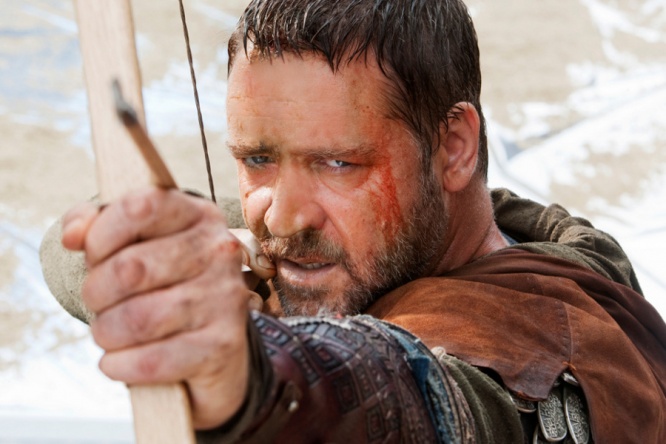 la cosa si riflette positivamente sui suoi filmâ. E questo Robin Hood scottiano è, sia pure solo per certi aspetti, indubbiamente figlio legittimo di certi suoi precedenti in celluloide a sfondo storico: si direbbe comunque che sia più figlio de Le crociate-The Kingdom of Heaven che de Il Gladiatore, la cui veste ricade in tempi cinematografici ben più distesi e forse per questo si fa meno fatica a ricordare memorabili scene madri. Robin Hood muove invece sul ritmo incalzante e spesso serratissimo di unâazione dominante, resa sempre affascinante da scorci di ripresa tutti scottiani che privilegiano visioni minimaliste dal basso e persino raso terra, ascensionali, dallâalto o in diagonale, a fuochi incrociati, alternate a suggestive panoramiche di stampo epico-romantico (crepuscolari o albeggianti su cui troneggiano la memorabile âsemina notturnaâ e la scenografica battaglia giostrata tra rupi, sterpaglia e spiaggia in riva al mare, la cui artistica e reiterata pioggia di
la cosa si riflette positivamente sui suoi filmâ. E questo Robin Hood scottiano è, sia pure solo per certi aspetti, indubbiamente figlio legittimo di certi suoi precedenti in celluloide a sfondo storico: si direbbe comunque che sia più figlio de Le crociate-The Kingdom of Heaven che de Il Gladiatore, la cui veste ricade in tempi cinematografici ben più distesi e forse per questo si fa meno fatica a ricordare memorabili scene madri. Robin Hood muove invece sul ritmo incalzante e spesso serratissimo di unâazione dominante, resa sempre affascinante da scorci di ripresa tutti scottiani che privilegiano visioni minimaliste dal basso e persino raso terra, ascensionali, dallâalto o in diagonale, a fuochi incrociati, alternate a suggestive panoramiche di stampo epico-romantico (crepuscolari o albeggianti su cui troneggiano la memorabile âsemina notturnaâ e la scenografica battaglia giostrata tra rupi, sterpaglia e spiaggia in riva al mare, la cui artistica e reiterata pioggia di |
|
 frecce è da manuale). Del resto in Robin Hood lâambientazione non fa da sfondo: la foresta è davvero autentica protagonista che, alla fine, complice della celebrazione del momento in cui inizia la âRobin Hoodâs Legendâ, strizza maliziosamente lâocchio ad un possibile sequel.
frecce è da manuale). Del resto in Robin Hood lâambientazione non fa da sfondo: la foresta è davvero autentica protagonista che, alla fine, complice della celebrazione del momento in cui inizia la âRobin Hoodâs Legendâ, strizza maliziosamente lâocchio ad un possibile sequel.
Ma non vi è dubbio che il nostro di occhi, qui non di rado sembra far fatica a star dietro ad una macchina da presa come âimbizzarritaâ e totalmente assorbita dai folleggianti âcolpi di codaâ con cui lancia splendidi scorci, a piene mani ma più velocemente della luce. Câè da dire che Ridley Scott mantiene sempre le sue promesse: alla ironica autointerrogazione ââ¦câè un sacco di azioneâ?â il âSiâ come risposta era giunto a ruota con estrema convinzione. Verrebbe da ribadire: alle volte un poâ ridondante, per quanto inframezzata da insistiti quadretti di sollazzi serali cui probabilmente lo stesso Scott si riferiva citando il âfolklore medievaleâ del film. |
|
 E questo malgrado, in mezzo a tal carestia in corso, ci fosse ben poco da festeggiare e sollazzarsi.
E questo malgrado, in mezzo a tal carestia in corso, ci fosse ben poco da festeggiare e sollazzarsi.
Ma ovviamente Ridley Scott è Ridley Scott, e da consumato cineasta conosce bene le aspettative del grande pubblico e non ha rinunciato, per quanto dominino le intricate griglie degli sporchi intrallazzi politici dellâepoca - ogni epoca ha i suoi - al romanticismo legato alla leggenda: là dove compare - fin dalle prime battute del racconto - in unâaura di fiera ed eroica quotidianità , unâispida e pungente Lady Marion, eroina romantica in pieno Medioevo ineccepibilmente incarnata da Cate Blanchett, la cui fierezza da nobile Elizabeth ha qui tradotto in genuina e valorosa dignità femminile. Personaggio che sembra soffrire lievemente - senza peraltro togliere alcunché allâeffettivo spessore - di un risalto risicato in un contesto narrativo senzâaltro più generoso nei rispetti della costestualizzazione para storica. Ed è sullâonda dei modi e delle ragioni per |
|
 cui Lady Marion incontra, conosce e si innamora di Robin Hood, che si innesta la poetica più rosea nel suo significato più alto del film. In un mondo indubbiamente dominato da uomini in cui solo Robin Hood e pochi altri sembrano coniugare la maschia rude temerarietà a un certo grado di gentilezza e rispetto, spicca una forza eroica tutta al femminile che oltre a Lady Marion compare in unâaltra figura femminile di quelle che non si dimenticano, malgrado il limitato spazio concessole dalla narrazione: la regale madre di Sua Maestà Riccardo Cuor di Leone e del Principe Giovanni. Donna dallâintelletto sveglio e sagace che cercherà peraltro conveniente appoggio in unâaltra insospettabile figura femminile, pressoché da sfondo.
cui Lady Marion incontra, conosce e si innamora di Robin Hood, che si innesta la poetica più rosea nel suo significato più alto del film. In un mondo indubbiamente dominato da uomini in cui solo Robin Hood e pochi altri sembrano coniugare la maschia rude temerarietà a un certo grado di gentilezza e rispetto, spicca una forza eroica tutta al femminile che oltre a Lady Marion compare in unâaltra figura femminile di quelle che non si dimenticano, malgrado il limitato spazio concessole dalla narrazione: la regale madre di Sua Maestà Riccardo Cuor di Leone e del Principe Giovanni. Donna dallâintelletto sveglio e sagace che cercherà peraltro conveniente appoggio in unâaltra insospettabile figura femminile, pressoché da sfondo.
Forza, onore e gentilezza, i valori in celluloide incarnati da Russell Crowe nei suoi personaggi grondanti di unâumanità di rara nobiltà dâanimo. Qualità che Robin Hood condivide con Il Gladiatore Massimo, diversi quanto emblematicamente |
|
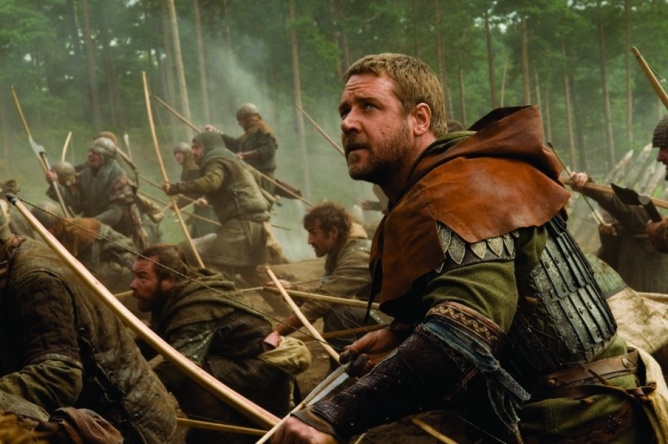 esemplari, uomini veri prima che mitiche icone prestate alla storia dalla leggenda, là dove non è più possibile tracciare un confine di demarcazione e la cosa sembra dâaltra parte non aver più grande importanza. Almeno fin quando ci saranno autori e interpreti in grado di far della celluloide unâarte. E in un prodotto artistico di livello câè sempre qualcosa di memorabile. Che cosa ricorderemo allora - oltre a quanto già indicato - di questo Robin Hood scottiano? La levatura dello âscriptâ, ricco di passi incisivamente intriganti ad effetto; la prova di sincerità di Robin/Crowe data a Sua Maestà Riccardo Cuor di Leone (Danny Huston) con la rievocazione del vergognoso massacro di Acri e della donna - ancora una volta una forza tutta femminile in grado di colpire indelebilmente nel segno - che nei suoi occhi aveva solo pietà ; lâesempio di viltà più grande sfoderata dallââinglese per convenienzaâ, combattendo un vecchio
esemplari, uomini veri prima che mitiche icone prestate alla storia dalla leggenda, là dove non è più possibile tracciare un confine di demarcazione e la cosa sembra dâaltra parte non aver più grande importanza. Almeno fin quando ci saranno autori e interpreti in grado di far della celluloide unâarte. E in un prodotto artistico di livello câè sempre qualcosa di memorabile. Che cosa ricorderemo allora - oltre a quanto già indicato - di questo Robin Hood scottiano? La levatura dello âscriptâ, ricco di passi incisivamente intriganti ad effetto; la prova di sincerità di Robin/Crowe data a Sua Maestà Riccardo Cuor di Leone (Danny Huston) con la rievocazione del vergognoso massacro di Acri e della donna - ancora una volta una forza tutta femminile in grado di colpire indelebilmente nel segno - che nei suoi occhi aveva solo pietà ; lâesempio di viltà più grande sfoderata dallââinglese per convenienzaâ, combattendo un vecchio |
|
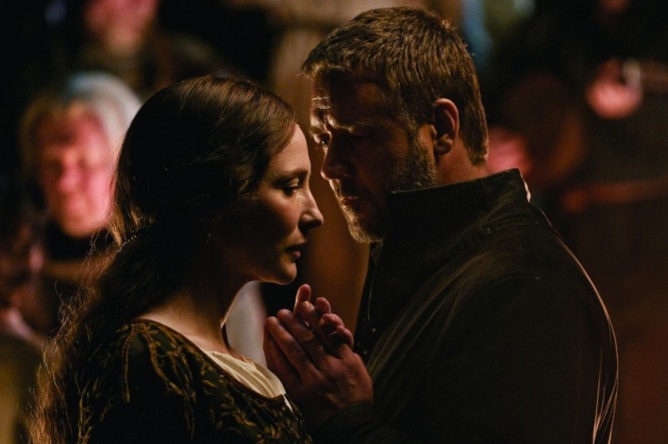 cieco colpendolo a morte alle spalle (evitiamo di proposito di svelare chi); il dialogo-rivelazione tra il vecchio Sir Walter Loxley (Max von Sydow) e Robin Hood/Crowe, epicamente valorizzato da singolari scorci di primissimi piani alternati alla stregua del drammatico incontro tra Priamo e Achille nel Troy di Wolfgang Petersen, che torna in mente anche per le esequie del defunto; le donne con vecchi e bambini rinchiusi nel granaio di legno in una sorta di antesignano olocausto; ma anche un dettaglio minimalista (raffinatezza tutta scottiana) come lâostrica macchiata di sangue a suggello di un tradimento equivalente ad un pianificato patto di morte; lâumoristica battuta di Robin/Crowe che vede la âgraziaâ come pretesa: âchiedetemelo con grazia!â; i virtuosismi figurativi sfoggiati sui titoli di testa e di coda; il motto inciso sullâelsa della âpreziosaâ (sul piano umano e morale) spada: âRibellarsi e ribellarsi ancora, finché gli agnelli non diverranno leoniâ, vale a dire
cieco colpendolo a morte alle spalle (evitiamo di proposito di svelare chi); il dialogo-rivelazione tra il vecchio Sir Walter Loxley (Max von Sydow) e Robin Hood/Crowe, epicamente valorizzato da singolari scorci di primissimi piani alternati alla stregua del drammatico incontro tra Priamo e Achille nel Troy di Wolfgang Petersen, che torna in mente anche per le esequie del defunto; le donne con vecchi e bambini rinchiusi nel granaio di legno in una sorta di antesignano olocausto; ma anche un dettaglio minimalista (raffinatezza tutta scottiana) come lâostrica macchiata di sangue a suggello di un tradimento equivalente ad un pianificato patto di morte; lâumoristica battuta di Robin/Crowe che vede la âgraziaâ come pretesa: âchiedetemelo con grazia!â; i virtuosismi figurativi sfoggiati sui titoli di testa e di coda; il motto inciso sullâelsa della âpreziosaâ (sul piano umano e morale) spada: âRibellarsi e ribellarsi ancora, finché gli agnelli non diverranno leoniâ, vale a dire |
|
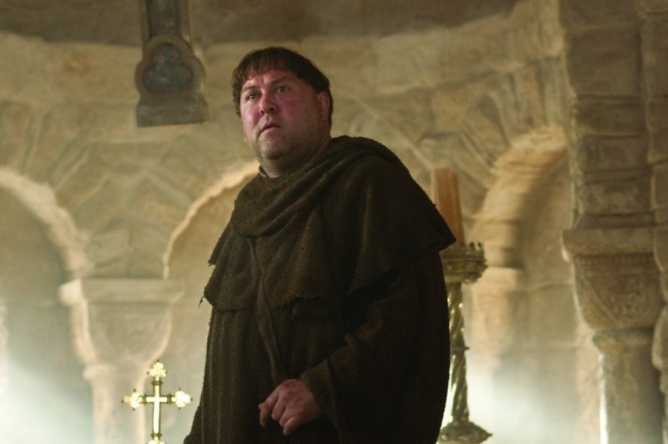 il cuore di tutta la storia, dedicata a Bret Johnson.
il cuore di tutta la storia, dedicata a Bret Johnson.
ENGLISH VERSION:
Ridley Scott finds always the right key for every script and plot, to face himself with stories 'archetypes'. And the taste for big scene, mother scenes as furious and heroical battles, so peculiar in these para-historical kolossal-romance stories, canât be forgotten; aggressions and assault on fire, are strictly interwoven with historical and political range mixed between the rampant pictures of that folk music nights in Nottingham. Evenings to forget a bit the black misery of a village where is a neo Robin Hood acting; more philospher than outlaw, unerring archer sorrounded by a radiant human being made by strength, honor, love and solidarity, shared with the romantic heroine Lady Marion/ Blanchett.
Define 'outlaws'. Ridley Scott's Robin Hood is opened by some gothic script lettersâ titles, just to unederline this pararomantic-historical fresco in which he faces one of the most popular |
|
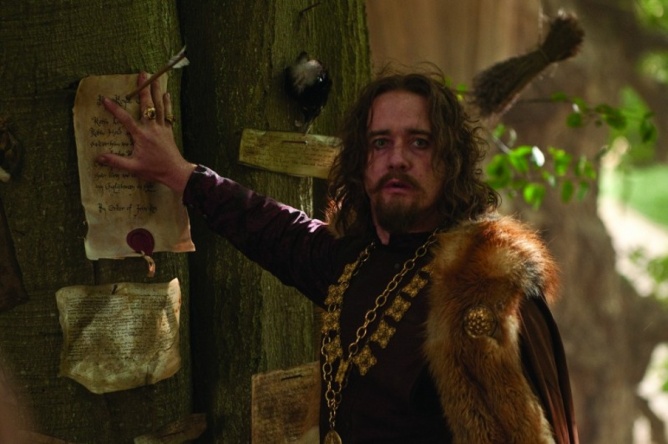 hero-figures over times and years along the small and big screen.
hero-figures over times and years along the small and big screen.
And for his audience is immediately clear that focus on key engine of the whole epic story.
And there is no doubt that in this fresco so accurate in terms of scenery, costumes and photography we can find also examples on what, how, when and why, outlaws can express themselves, between raids, incursions of marauders and castles on fire; Scott does not miss anything on the set of his Robin Hood, and who could have chosen if not his âfetish actorâ Russell Crowe? And, how could have been wrong?
Crowe confirms undoubtedly his best and reflects on the screen a kaleidoscope of unforgettable lights drawing a sort of cammeo-figure, a mirrored image of Scott thought about the soul of each character and history that by actors is called alive. Their view runs faster on the same track, this time conveying |
|
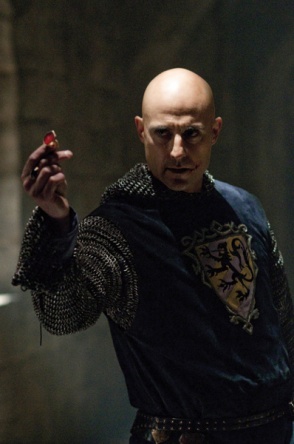 in a narrative contextualisation of the origins of a character usually shown in the variety of chapters usually focused on what has made him a legend.
in a narrative contextualisation of the origins of a character usually shown in the variety of chapters usually focused on what has made him a legend.
Ridley Scott and Russell Crowe have happily opted instead to close where others have begun to open, a total new point of view, other than the used biopic and focused on a story with no more than a flashback to trace the crucial steps of a total new Robin Hood so unexpected and surprising.
The writer and co-screenwriter Brian Hegeland have just focused the attention to that peculiar Scottâs ability: "When you're dealing with catapults and phalanxes of men trying to set fire to the doors of a castle and men who care about God - who it is and the reasons why they have done in battle - Ridley is on the ground that finds more intellectually stimulating. And it reflects positively |
|
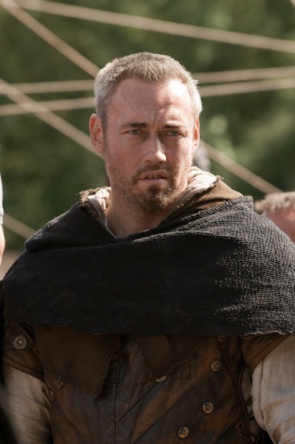 on his films."
on his films."
This Robin Hood is, in a sense, the perfect son of Scottâs literay and poetical point of view and belongs directly from his previous celluloid-historical background, nearer to The Crusades-The Kingdom of Heaven than The Gladiator, two films that have a different aim to show and share images with a more narrative rythm in wich is possible to recognize and recall some mother-scenes.
This Robin Hood instead moves on fast-paced action, in a perfect Scottâs style with that shooting from below, at ground level, upward, down or diagonally, alternating a suggestive panoramic-style so suited and romantically epic (twilight or dawning upon which dominate the memorable scenes of the 'seeding night' and the spectacular battle setting through beach and rocks near the sea, in a rain of arrows).
But in Robin Hood is not only a setting, is the real story of a background: the forest is indeed a |
|
 true protagonist in this complicity making game and celebration between the moment Robin begins his legend winking the eye to a possible sequel.
true protagonist in this complicity making game and celebration between the moment Robin begins his legend winking the eye to a possible sequel.
But there is no doubt that our eyes, often seems to struggling to follows all the cameraâs runaway wonderful views sometimes faster than the light.
And Ridley Scott always keeps promises, and the ironic question "... there's plenty of action'?" and the answer "Yes" makes with a real convinction: the result is an interwoven plot made by 'medieval evenings folk' and pure action.
Of course Ridley Scott as experienced filmmaker, knows the audienceâs expectations but has not renounced to show the intricate grids of dirty political games of that time, remembering that every age has its own, so strictly linked to the romantic legend and, right from the start of the story, appears, in an âauraâ of proud and heroical everydaylife-style a stinging and tempered on fire Lady |
|
 Marion, one of the most well known Medieval romantic heroine here embodied by Cate Blanchett, whose noble pride of Elizabeth here is translated into genuine and brave dignity of women.
Marion, one of the most well known Medieval romantic heroine here embodied by Cate Blanchett, whose noble pride of Elizabeth here is translated into genuine and brave dignity of women.
A character who seems to suffer a bit, in a so tight narrative context where the dominant theme is the historical point of view.
And itâs on the wave and on ways and reasons for wich Lady Marion meet, knows and loves Robin Hood, that joins the highest poetical meaning of the film. In a world dominated by men and with a character as Robin Hood and a few others, here is possible to combine the rough male recklessness to a certain degree of kindness and respect, and a pure heroical strenght of a women as Lady Marion.
And is another female figure that here is not forgotten, despite the limited space granted by the narrative rythm: the royal mother of Richard the Lionheart and Prince John. A charismatic and smart woman and figure.
Strength, honour and kindness, the values embodied in celluloid by Russell Crowe in the humanity of his characters dripping with rare nobility.
Quality that Robin Hood - Gladiator Maximus shares, as a real men until legendary icons, where the line between these aspects has not a main importance.
What to be remembered then - besides the already mentioned â in this Robin Hood Scott?
The stature of the 'script', the proof of sincerity of Robin/Crowe given to His Majesty, Richard the Lionheart (Danny Huston) with the evocation of the shameful massacre of Acre and a woman - again a female indelible mark - and the example of cowardice in fighting a blind old man to death by hitting behind (deliberately we avoid to reveal who); or the revelation dialogue between the old Sir Walter Loxley (Max von Sydow) and Robin Hood / Crowe , epically enhanced by unique views of the alternating close-ups like the dramatic dialogue between Priam and Achilles in Troy by Wolfgang Petersen; the women and children locked in old wooden barn in a sort forerunner of holocaust, but also a typical minimalistic Scottâs touch detail as the oyster stained with blood as an equivalent to a betrayal of a planned death pact; the humorous quip Robin/Crowe sees the 'grace' as a claim when he says "ask me with grace!"; the virtuosistic figurative flaunted headlines an the motto engraved on the hilt of the 'sword, "Rise and rise again, until the lambs become lions", the very heart of all history, dedicated to Bret Johnson.
(Traduzione a cura di ENRICA MANES) |
Secondo commento critico (a cura di ENRICA MANES)
|
 Scott ama le emozioni forti, e se indulge nel tema a lui caro della battaglia fra la penombra di boschi ed intricati sentieri percorsi da eroici condottieri a cavallo, stavolta dimentica il medioevo buio e sanguinario fine a se stesso e ci riporta ad un Robin che non è soltanto epico ma torna ad essere uomo.
Scott ama le emozioni forti, e se indulge nel tema a lui caro della battaglia fra la penombra di boschi ed intricati sentieri percorsi da eroici condottieri a cavallo, stavolta dimentica il medioevo buio e sanguinario fine a se stesso e ci riporta ad un Robin che non è soltanto epico ma torna ad essere uomo.
Prima uomo e poi storia.
Si passa dal giudizio severo sullâinsensatezza di un lungo e logorante conflitto come le Crociate e su di un monarca simbolo di unâepoca come Riccardo Cuor di Leone - non più tratteggiato come mitico esempio ma come uomo dâarmi anche spietato - per arrivare ai rapporti tra i sudditi ed il nuovo re, quel Giovanni che da âSenza Terraâ, (ultimogenito della nota ed imponente figura di Eleonora DâAquitania), prima di rilasciare la Magna Charta, fa pagare a caro prezzo i diritti dei lord e del popolo.
Un re ben poco amato, suscettibile, |
|
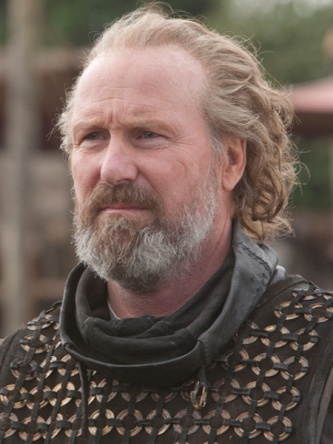 debole e fazioso, ritratto che tuttavia non appesantisce mai la storia, né il ritmo della narrazione; non câè spazio per gli stereotipi, e dire che sarebbe stato facile chiosare lâarcinota leggenda anche nella scelta dei personaggi.
debole e fazioso, ritratto che tuttavia non appesantisce mai la storia, né il ritmo della narrazione; non câè spazio per gli stereotipi, e dire che sarebbe stato facile chiosare lâarcinota leggenda anche nella scelta dei personaggi.
E se forse può sembrare inusuale la scelta di un muscoloso e decisamente vissuto Russel Crowe, al posto di un più convenzionale uomo semplicemente atletico, aitante, sbarbato o con pizzetto e baffi con aria irridente âalla Errol Flynnâ, Scott vede bene anche in questo ed ha il coraggio di narrare, (come già ben rappresentato nel celebre e fortunato Robin Hood- Prince of Thieves con Kevin Costner, diretto da Kevin Reynolds nel 1991), le vicende di un uomo ed una donna maturi, plasmati dalla fatica e dallâaver vissuto tanto il sangue quanto la pietà sulla propria pelle.
Qui non si abusa dei sentimentalismi né in inutili vene romanticheggianti, ci sono eroi ma prima di tutto uomini, attori |
|
 degni dei personaggi in cui si immergono fino a diventarne parte.
degni dei personaggi in cui si immergono fino a diventarne parte.
Sarà che Crowe ha abbandonato la veste intriseca del gladiatore ed è tornato semplicemente uomo, neanche troppo condottiero, capace di mettere insieme azione e sentimento con un livello di interpretazione annoverabile tra i suoi migliori; ad affiancarlo, una splendida Cate Blanchett che in queste intense e carismatiche figure in costume esalta le proprie doti e le sue qualità , davanti alle quali non si può essere indifferenti al lato umano ed alla forte carica espressiva ed emotiva sprigionata.
Ed è questa umanità che colpisce e che smitizza, del tutto e senza dubbio, ogni possibile caduta nel triste già visto dello stereotipo
Scott va alle radici della storia, quando lâuomo non era ancora leggenda e se la scena dello sbarco francese riecheggia una Normandia in versione medioevale, nulla è lasciato al caso.
Epico come Elizabeth - The Golden Age di Khapur, da cui |
|
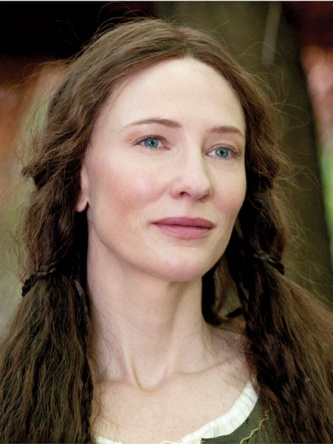 qualche citazione (nelle scene di battaglia sulla costa, con affondamento di vessilli, uomini e cavalieri con le navi sulla riva e allâorizzonte) è tratta, inglesissimo e potente nello stile, dà ritmo e tiene avvinti per una storia equilibrata in cui lâazione non si perde mai nel nulla e si bilancia con un quotidiano finemente ricostruito, reso pulsante da una splendida colonna sonora e cogliendo da vincente la sfida mai scontata della sceneggiatura.
qualche citazione (nelle scene di battaglia sulla costa, con affondamento di vessilli, uomini e cavalieri con le navi sulla riva e allâorizzonte) è tratta, inglesissimo e potente nello stile, dà ritmo e tiene avvinti per una storia equilibrata in cui lâazione non si perde mai nel nulla e si bilancia con un quotidiano finemente ricostruito, reso pulsante da una splendida colonna sonora e cogliendo da vincente la sfida mai scontata della sceneggiatura.
ENGLISH VERSION
Scott loves the pure excitement and strong emotions, and if indulged in his favorite theme of the battle in the darkness of woods and intricate paths traveled by heroic commanders on horseback, this time forget the medieval dark and bloodish idea in itself and moves us back to a Robin that here is not only epic but a man.
Man, and then history.
The film moves from a severe criticism of a long and exhausting conflict as |
|
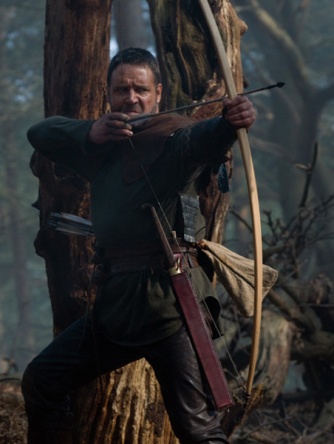 the Crusades and a monarch symbol of an era as Richard the Lionheart - not dashed as mythical as usual, but here ruthless military man - to get the relationship between peolpe, law and the new king, that John "Lackland", (the youngest son of Eleanor of Aquitaine), before issuing the Magna Charta, and the fight for the rights of lords and the people.
the Crusades and a monarch symbol of an era as Richard the Lionheart - not dashed as mythical as usual, but here ruthless military man - to get the relationship between peolpe, law and the new king, that John "Lackland", (the youngest son of Eleanor of Aquitaine), before issuing the Magna Charta, and the fight for the rights of lords and the people.
A not loved king, weak and partisan, but this time there are no pictures of him, there is no room for stereotypes, and it would be easy to gloss the well-known legend in the choice of characters .
And if perhaps it may seem unusual a so muscular and very experienced Russell Crowe, instead of a more conventional man simply athletic, handsome, clean-shaven or goatee and mustache with a mocking âErrol Flynnâs airâ, Scott sees well in this project and has the courage to tell |
|
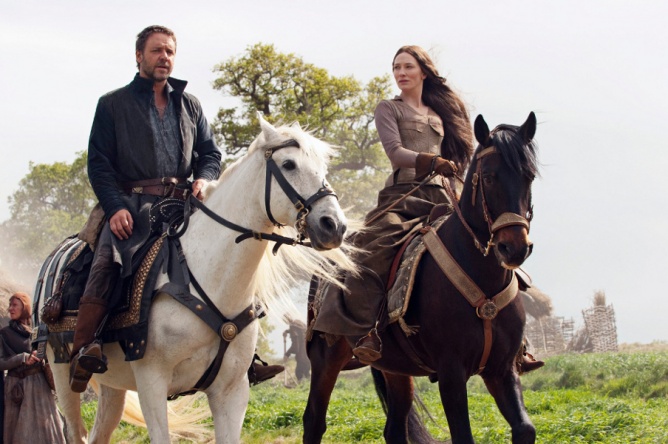 (as is already well represented in the popular and successful Robin Hood Prince of Thieves with Kevin Costner, directed by Kevin Reynolds in 1991), the story of a man and a mature woman, shaped by hard work and by having lived so much blood and pity on their skin.
(as is already well represented in the popular and successful Robin Hood Prince of Thieves with Kevin Costner, directed by Kevin Reynolds in 1991), the story of a man and a mature woman, shaped by hard work and by having lived so much blood and pity on their skin.
And we canât find any abuse of unnecessary sentimentalism, nor romantic veins because here there are not heroes but first of all men, actors worthy of the characters in which they become a very intense part of.
Crowe has definitly abandoned is âgladiator style-labelâ and heâs just returned man, not only a leader, not only a myth, but able to put together action and feelings with a level of interpretation mentioned among his best; alongside him, a wonderful Cate Blanchett that in these intense and charismatic historic figures enhances her skills and qualities, and we can not be indifferent to the human |
|
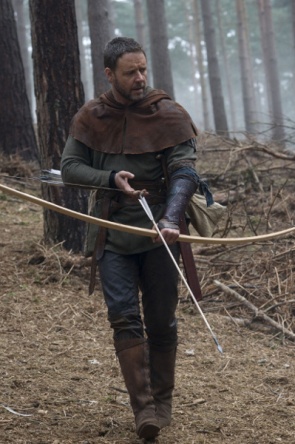 side and her powerful, expressive and emotional way of acting.
side and her powerful, expressive and emotional way of acting.
And it is this humanity that strikes and demystify, completely and without doubt, every possible drop in the sad - already seen â stereotype.
Scott goes to the roots of history, when man was not yet legend, and whether the scene of the French landing, echoes a Normandy medieval version, nothing is left to case.
Epic like Elizabeth - The Golden Age by Khapur, from which a few quotes (in the battle scenes on the coast, with sinking of flags, men,horses and the ships on the shore, the horizon...) are taken, so English and powerful in style, let keep pace and be captivated, strictly involved in a so balanced story where the action never looses its interest and rythm made from an intense soundtrack and a screenplay that wins its personal very difficult challenge.
(Traduzione a cura di ENRICA MANES) |
|
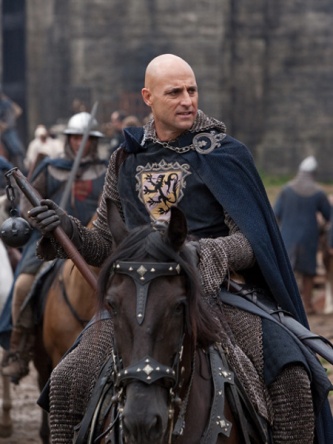
|
Commenti dei protagonisti:
RUSSELL CROWE (Robin Hood):
Per prepararsi a questo ruolo, Crowe ha letto più di 30 libri su Robin Hood e sul periodo compreso tra la fine del 12° secolo e gli inizi del 13°:
âRobin assiste all'uccisione del padre a soli 5 anni. E viene poi lasciato in un monastero dei Cavalieri Templari in Francia. I suoi tutori [Loxley e Marshal] partono per la Crociata, ma al loro ritorno, numerosi anni dopo, il ragazzo non è più lì. Ha trascorso un periodo terribile, è stato trattato molto male, e se ne è andato con l'unico suo possesso, l'armatura di suo padre. Potete immaginare un bambino che si trascina dietro una pesante armatura da adulto... Ha rimosso il ricordo dell'uccisione del padre. Nella sua mente, suo padre e sua madre si sono semplicemente liberati di lui ed hanno smesso di amarlo. Ed ecco quello che ha finito col credere negli ultimi 35 o 40 anni. Ma adesso è nuovamente vicino all'Inghilterra. Ha viaggiato per tutta l'Europa e in Medio Oriente. Ha conosciuto più di un modo di vivere, e quando torna in Inghilterra è sorpreso nello scoprirla un paese così oppresso. Lo seguiamo nel suo viaggio alla ricerca e alla scoperta di se stesso. E lungo la strada comincia a ricordare il passato, cosa che rinforza la sua ricerca. Si rende conto di essere stato travolto dal destino, e di essere diventato parte di qualcosa di molto più grande di ciò che pensava. Mentre cerca se stesso, si ritrova a portare avanti il lavoro iniziato da suo padre, partendo dal punto in cui questi lo aveva lasciato".
CATE BLANCHETT (Marion):
âSi tratta di una storia che viene costantemente reinventata. Non esiste una unica verità sul mito di Robin Hood. Persino in Shakespeare, quando la cita in 'Come vi piace' â âcome il vecchio Robin Hood d'Inghilterraâ. E' un mito, e in ogni epoca la storia viene raccontata nel tentativo di trovare nel mito qualcosa che rifletta una parte della società di quel periodo. Si basa su alcuni archetipi particolari, come la banda dei 'Merry Men'. E' una costruzione narrativa senza tempo, e ogni epoca imprime il suo marchio di fabbrica su una storia archetipa come questaâ.
RUSSELL CROWE a proposito della relazione Robin Hood-Marion:
âLa relazione con Marion presenta una serie di elementi shakespeariani. Ricorda molto La bisbetica domata. All'inizio Robin e Marion non vanno per nulla d'accordo, ma nel profondo esiste dell'attrazione tra i due. Sono creature simili che per tutta la vita hanno cercato segni della gentilezza innata in altre personeâ.
Altre voci dal set:
Il produttore BRIAN GRAZER:
âMi piacciono i film sugli eroi. La storia di Robin Hood mi ha da sempre affascinato in maniera particolare perché si tratta di un uomo che ha in mente solo la giustizia, e che possiede le capacità e la risolutezza per perseguirla... Con il nostro film, spieghiamo chi siano lo Sceriffo di Nottingham, Marion e suo suocero, quali siano le dinamiche tra i baroni della parte nord dell'Inghilterra, e come all'epoca essa venisse controllata. Alla fine del film, si capisce anche chi sia Robin. La fine del nostro film è l'inizio di tutte gli altri film realizzati finora su questo leggendario personaggio... Ci voleva un regista con una visione straordinariamente ampia, qualcuno che amasse l'autenticità , che fosse interessato al milieu, all'epoca e agli avvenimenti storici e politici del periodo. Ridley è particolarmente attento a tutte queste cose. Se questo film doveva essere realizzato, sarebbe dovuto essere un Robin Hood nello stile de 'Il gladiatore'. Desideravo che mettesse in risalto la brutalità dell'epoca e che essa venisse espressa visivamente in maniera emozionante, in un thriller di avventura e azione. E solo Ridley poteva riuscirci... Volevamo inserire la storia nella cornice degli eventi storici e politici dell'epoca: L'Inghilterra era alla bancarotta, minacciata sia dalla guerra civile che dalla Francia, e nelle mani di un re incapace, Giovanni. E su questo sfondo potevamo inserire il racconto di come Robin Hood fosse divenuto quello che era.â
Lo scrittore BRIAN HEGELAND:
âQuando hai a che fare con catapulte e falangi di uomini che tentano di dar fuoco alle porte di un castello e uomini che si preoccupano di Dio â di chi esso sia e delle ragioni per cui li abbia condotti in battaglia â Ridley (Scott) è sul terreno che trova intellettualmente più stimolante. E la cosa si riflette positivamente sui suoi film".
Pressbook:
 PRESSBOOK COMPLETO IN ITALIANO
PRESSBOOK COMPLETO IN ITALIANO
 PRESSBOOK COMPLETO IN INGLESE - Production Notes
PRESSBOOK COMPLETO IN INGLESE - Production Notes
Links:
• LEGGENDA DI UN MITO - STORIA DI UN UOMO (CineSpigolature)
• ROBIN HOOD di RIDLEY SCOTT: Postilla al DVD (CineSpigolature)
• ROBIN HOOD - Clip 'Il mito di Robin' - Note di produzione (Dietro le quinte)
• ROBIN HOOD - 'Il making of di Robin' - Note di produzione (Dietro le quinte)
• ROBIN HOOD - 'Una freccia per la foresta' - Campagna pubblicitaria in difesa dei parchi italiani (Dietro le quinte)
Altri Links:
- Sito ufficiale
- Fanpage su Facebook
Galleria Fotografica:
 Robin Hood - trailer 3.flv
Robin Hood - trailer 3.flv
 Robin Hood - trailer 2.flv
Robin Hood - trailer 2.flv
 Robin Hood - trailer.flv
Robin Hood - trailer.flv
 Robin Hood - trailer HD.mp4
Robin Hood - trailer HD.mp4
 Robin Hood - featurette 'Battle' i protagonisti introducono i luoghi delle riprese (versione originale sottotitolata).flv
Robin Hood - featurette 'Battle' i protagonisti introducono i luoghi delle riprese (versione originale sottotitolata).flv
 Robin Hood - featurette 'L'uomo dietro la leggenda' R.Scott e R.Crowe raccontano la vicenda dell'uomo che divenne Robin Hood (versione originale sottotitolata).flv
Robin Hood - featurette 'L'uomo dietro la leggenda' R.Scott e R.Crowe raccontano la vicenda dell'uomo che divenne Robin Hood (versione originale sottotitolata).flv
 Robin Hood - featurette 'Archery Training' R.Crowe e gli altri protagonisti raccontano la loro preparazione all'uso di archi e frecce (versione originale sottotitolata).flv
Robin Hood - featurette 'Archery Training' R.Crowe e gli altri protagonisti raccontano la loro preparazione all'uso di archi e frecce (versione originale sottotitolata).flv
 Robin Hood - clip 'Robin speaks to King John and the gathered armies'.flv
Robin Hood - clip 'Robin speaks to King John and the gathered armies'.flv
 Robin Hood - clip 'Robin, Marion, and the people of Nottingham fight Godfreyâs intruders'.flv
Robin Hood - clip 'Robin, Marion, and the people of Nottingham fight Godfreyâs intruders'.flv
 Robin Hood - clip 'Robin introduces his merry men to Marion'.flv
Robin Hood - clip 'Robin introduces his merry men to Marion'.flv
 Robin Hood - clip 'Robin and the Archer'.flv
Robin Hood - clip 'Robin and the Archer'.flv
 Robin Hood - clip 'Il mito di Robin'.flv
Robin Hood - clip 'Il mito di Robin'.flv
Il giudizio della critica
|
The Best of Review
|
International Press
JUSTIN CHANG (www.variety.com):
"'Can you not sing a happy tune?' growls a not-so-merry man in 'Robin Hood', and one might direct the same question at Ridley Scott's grimly revisionist take on England's most famous outlaw. Impressively made and serious-minded to a fault, this physically imposing picture brings abundant political-historical dimensions to its epic canvas, yet often seems devoted to stifling whatever pleasure audiences may have derived from the popular legend. With a brawny Russell Crowe in the title role, pic looks to hit its B.O. target in most markets, though overall muted reactions may hold Universal back from a king's ransom Stateside". |
Italian
Press
|
<- torna alla pagina Movies & DVD
|
|
|


